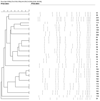Strain-relatedness of methicillin-resistant Staphylococcus aureus isolates recovered from patients with repeated infection
- PMID: 18444862
- PMCID: PMC2723744
- DOI: 10.1086/529381
Strain-relatedness of methicillin-resistant Staphylococcus aureus isolates recovered from patients with repeated infection
Abstract
Invasive disease following methicillin-resistant Staphylococcus aureus (MRSA) detection is common, regardless of whether initial detection involves colonization or infection. We assessed the genetic relatedness of isolates obtained > or =2 weeks apart representing either repeated infections or colonization-infection sets to determine if infections are likely to be caused by previously harbored strains. We found that MRSA infection following initial colonization or infection is caused by the same strain in most cases, suggesting that a single successful attempt at decolonization may prevent the majority of later infection.
Figures

References
-
- Huang SS, Platt R. Risk of methicillin-resistant Staphylococcus aureus infection after previous infection or colonization. Clin Infect Dis. 2003;36:281–285. - PubMed
-
- Huang SS, Hinrichsen VL, Stulgis L, et al. Methicillin-resistant Staphylococcus aureus infection in the year following detection of carriage [abstract 157]. Programs and abstracts of the 16th Society of Healthcare Epidemiology of America Annual Meeting (Chicago); Arlington, VA. Society of Healthcare Epidemiology of America.2006.
-
- Loeb M, Main C, Walker-Dilks C, Eady A. Antimicrobial drugs for treating methicillin-resistant Staphylococcus aureus colonization. Cochrane Database Syst Rev. 2003;4 CD003340. - PubMed
-
- Simor AE, Phillips E, McGeer A, et al. Randomized controlled trial of chlorhexidine gluconate for washing, intranasal mupirocin, and rifampin and doxycycline versus no treatment for the eradication of methicillin-resistant Staphylococcus aureus colonization. Clin Infect Dis. 2007;44:178–185. - PubMed

